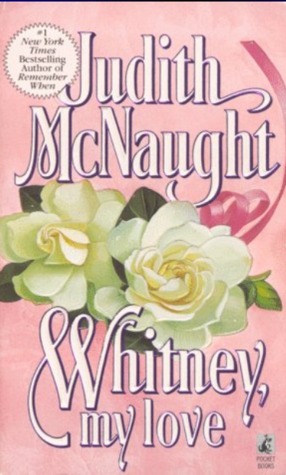
There is probably no more crowded genre than the romance genre, and yet it is a genre containing many fine stories. There's a general convention that men shouldn't read this genre, or that women who want a 'hot' romance won't find anything amongst these pages to suit them.
This isn't always the case, and I have always been open to read any kind of genre so long as the story is good. After all, a classic is a classic, regardless of how old it is.
Whitney, My Love by Judith McNaught is a classic of the genre, but having been lent the actual paperback copy by a friend and fellow blogger, I can honestly say the book was hugely enjoyable over the course of its 700 pages.
Whitney is the kind of heroine I like. She's feisty, headstrong and knows what she wants at a time when women's thoughts were often shunted by the men around them. With Whitney in love with Paul, she is determined to marry him one day. What father wouldn't want his daughter to be happy? And yet, Whitney's want for Paul is met with incredulity at first by her father, and soon after, extreme anger.
A story that started so light and enjoyable suddenly took a turn for the extremely dark, and now the question was why her father was so insistent Whitney marry someone else?
Money. Ah, the age old crippler of those who do not have it. Marrying Whitney into money seems to be the only way to resolve the financial situation her father is in.
Poor Whitney! The father who wants his daughter to marry into money isn't a new theme, but bear in mind I have read this book after reading many others in the genre - often newer tales. I'm not saying Judith McNaught was the originator of this style of storytelling, but the facts are that she is so highly regarded in the genre, she may have come up with special story arcs and plot devices in the way that JRR Tolkien did for everyone who wrote high fantasy after he released Lord of the Rings.
At this point in the story, I wasn't sure if I had warmed enough to Whitney to care. But this book is so well written, so well plotted, that I just kept going back for more.
The drama of the story picks up apace a third of the way in, and never lets up.
Clayton is introduced to Whitney by her father. Aside from Paul, the bad guys are all men in this story, and she has no care for Clayton. In fact, I found myself wishing he would meet with a horse riding accident, or even better, have the piano fall on him. No such luck.
Is he that bad? Well, no, but once Whitney's rather overbearing father introduces the two together, he goes misses from the story, and we are unsure what Whitney thinks of that. After all, her father is supposed to be a template to show her what kind of man she might wed one day. If Clayton was not in his exhalted position, would they be even having this conversation? It's likely Whitney would have been fine with marrying Paul, hopefully with her father's blessing.
There's a particular scene that I can't give away here, but it certainly puts this book on a different level - no longer a light romance with a heart, it was a brutal and shocking scene that I had to read twice and check the cover - really? Could something like this happen - yes. Should it be in a romance? Not sure.
But it is the author's right to create the story as she deems fit.
I've had some time to distance myself from the book, and make sense of certain scenes. I think that particular scene fits the story, but I may be in the minority I expect!
Of course the story can be read on its own but I suspect it is better read as part of the series (Westmoreland) of which it is an integral part. I don't think it is fair to criticise it having not read the whole series.
On GoodReads and Amazon, I'm leaning towards five stars, but a fairer rating would be about 4.5. I'm typically harder on established authors, and friends have been saying to me for ages that 'You need to read Judith McNaught'. Having done so, I can say that this particular work is a standout in the genre, but not in the way you might think.
Not everyone will like the ending. Not everyone will like Whitney's sometimes bratty behaviour. I'll admit that the Duke came across as one dimensional sometimes. He seemed to view Whitney and women in general as property, which may fit with the period, but that doesn't mean it is right.
Overall, I loved this book and when I have caught up with other books in this genre and other genres, I'll be back into Judith's world.

No comments:
Post a Comment